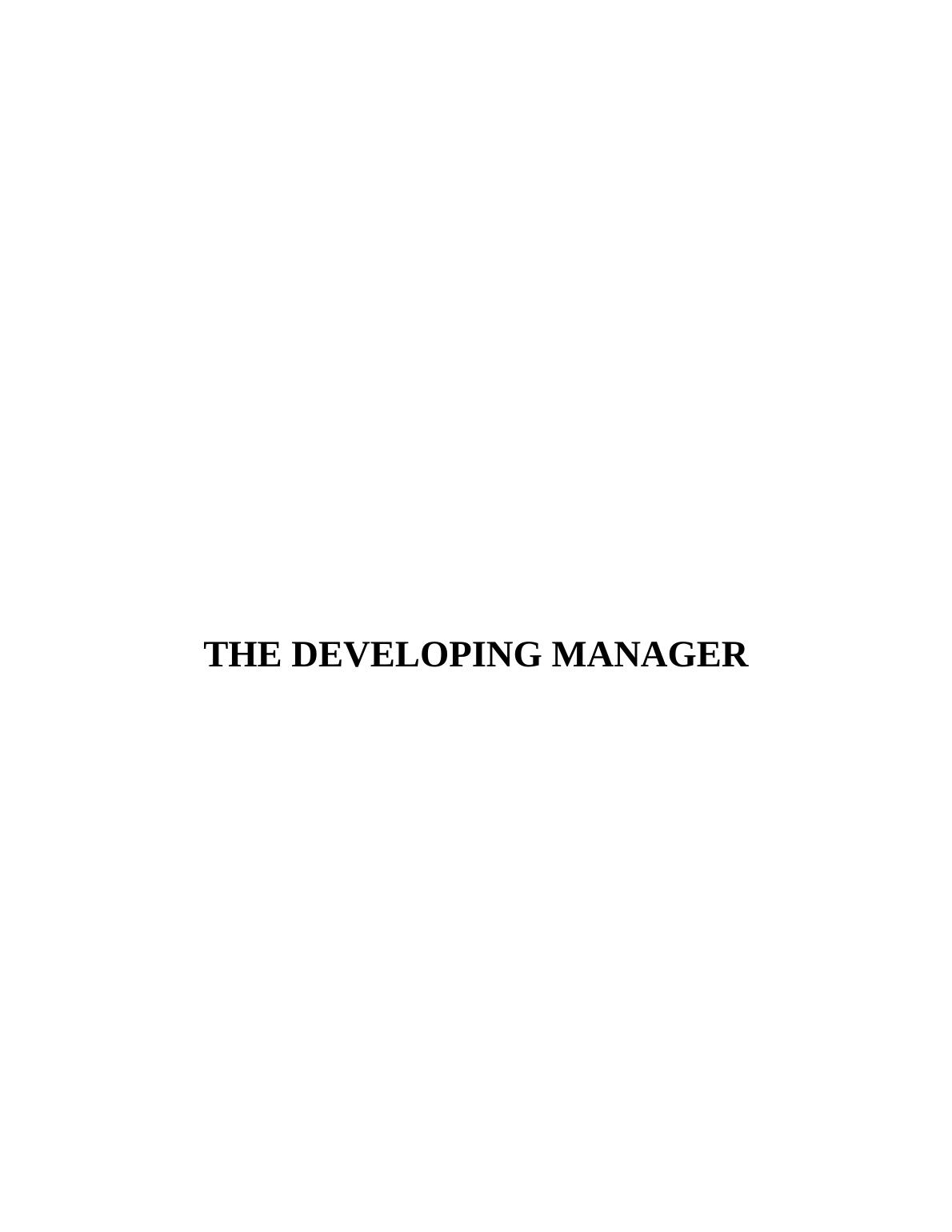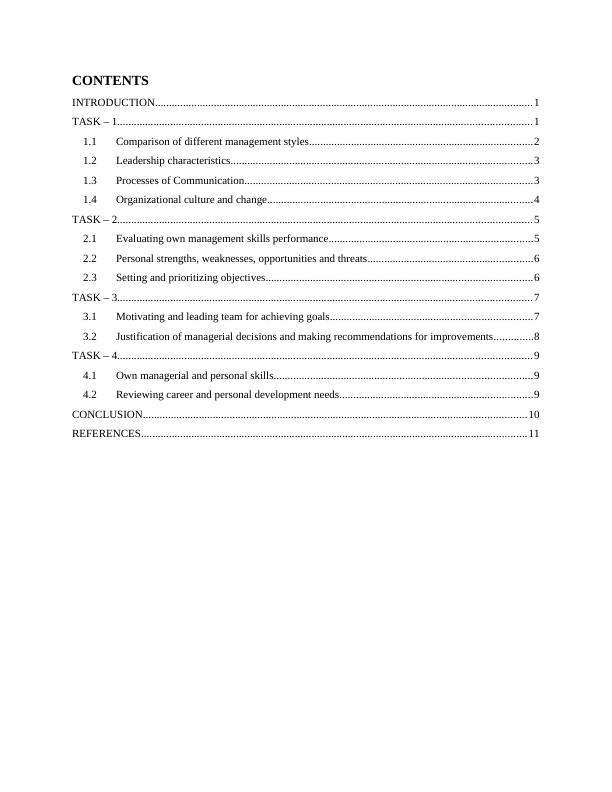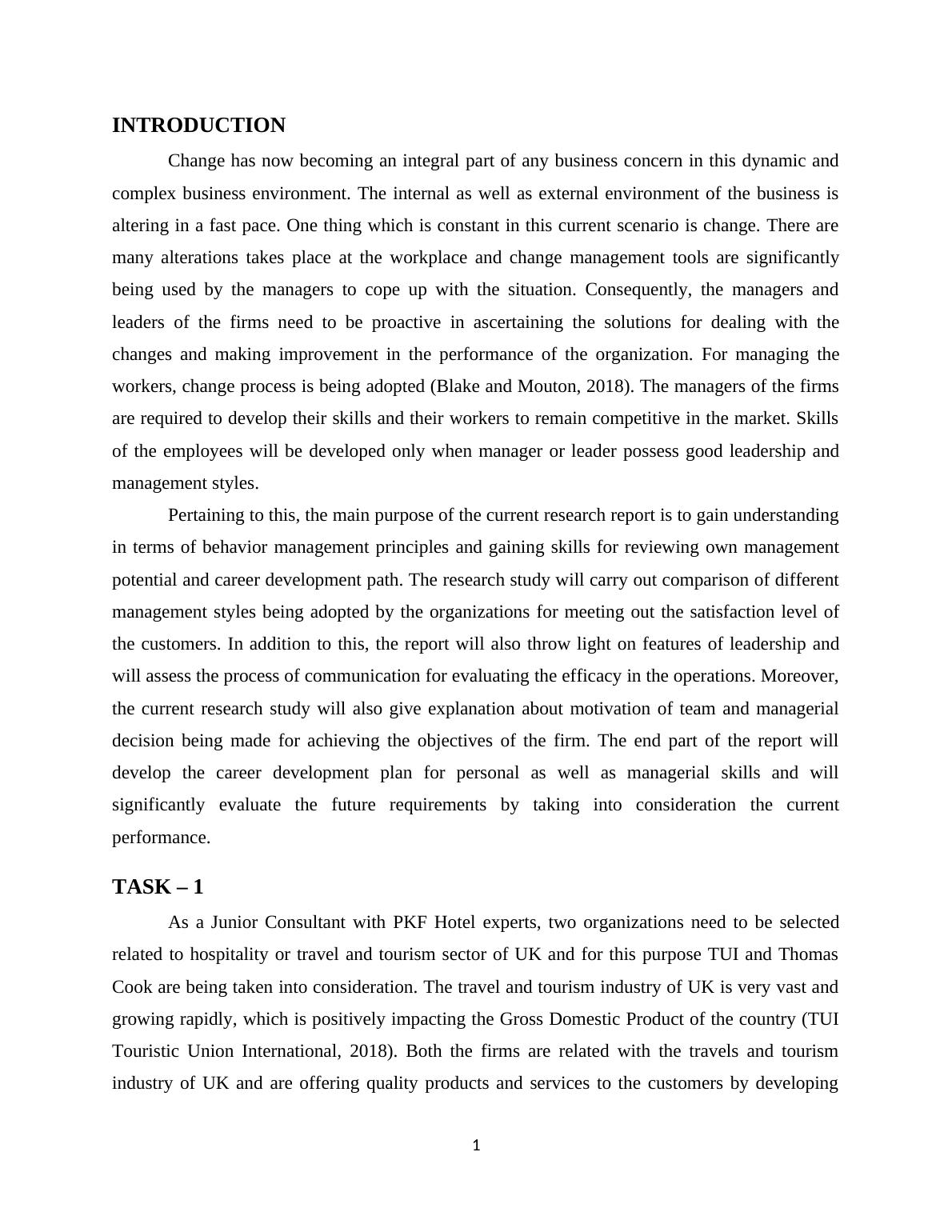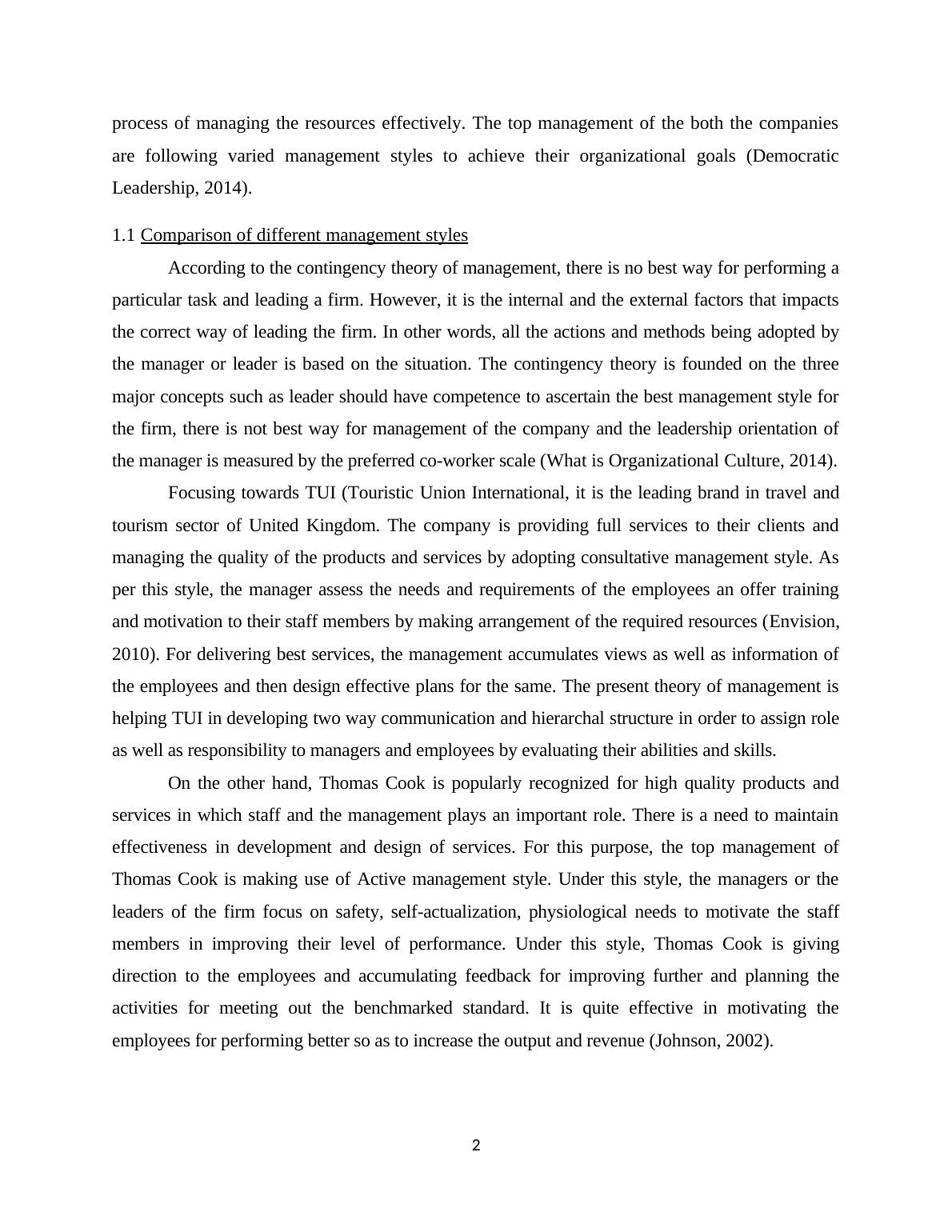Ask a question from expert
Organizational Culture and Change
15 Pages4584 Words66 Views
Added on 2020-11-23
Organizational Culture and Change
Added on 2020-11-23
BookmarkShareRelated Documents
THE DEVELOPING MANAGER

CONTENTS
INTRODUCTION.......................................................................................................................................1
TASK – 1....................................................................................................................................................1
1.1 Comparison of different management styles................................................................................2
1.2 Leadership characteristics............................................................................................................3
1.3 Processes of Communication.......................................................................................................3
1.4 Organizational culture and change...............................................................................................4
TASK – 2....................................................................................................................................................5
2.1 Evaluating own management skills performance.........................................................................5
2.2 Personal strengths, weaknesses, opportunities and threats...........................................................6
2.3 Setting and prioritizing objectives...............................................................................................6
TASK – 3....................................................................................................................................................7
3.1 Motivating and leading team for achieving goals........................................................................7
3.2 Justification of managerial decisions and making recommendations for improvements..............8
TASK – 4....................................................................................................................................................9
4.1 Own managerial and personal skills............................................................................................9
4.2 Reviewing career and personal development needs.....................................................................9
CONCLUSION.........................................................................................................................................10
REFERENCES..........................................................................................................................................11
INTRODUCTION.......................................................................................................................................1
TASK – 1....................................................................................................................................................1
1.1 Comparison of different management styles................................................................................2
1.2 Leadership characteristics............................................................................................................3
1.3 Processes of Communication.......................................................................................................3
1.4 Organizational culture and change...............................................................................................4
TASK – 2....................................................................................................................................................5
2.1 Evaluating own management skills performance.........................................................................5
2.2 Personal strengths, weaknesses, opportunities and threats...........................................................6
2.3 Setting and prioritizing objectives...............................................................................................6
TASK – 3....................................................................................................................................................7
3.1 Motivating and leading team for achieving goals........................................................................7
3.2 Justification of managerial decisions and making recommendations for improvements..............8
TASK – 4....................................................................................................................................................9
4.1 Own managerial and personal skills............................................................................................9
4.2 Reviewing career and personal development needs.....................................................................9
CONCLUSION.........................................................................................................................................10
REFERENCES..........................................................................................................................................11

INTRODUCTION
Change has now becoming an integral part of any business concern in this dynamic and
complex business environment. The internal as well as external environment of the business is
altering in a fast pace. One thing which is constant in this current scenario is change. There are
many alterations takes place at the workplace and change management tools are significantly
being used by the managers to cope up with the situation. Consequently, the managers and
leaders of the firms need to be proactive in ascertaining the solutions for dealing with the
changes and making improvement in the performance of the organization. For managing the
workers, change process is being adopted (Blake and Mouton, 2018). The managers of the firms
are required to develop their skills and their workers to remain competitive in the market. Skills
of the employees will be developed only when manager or leader possess good leadership and
management styles.
Pertaining to this, the main purpose of the current research report is to gain understanding
in terms of behavior management principles and gaining skills for reviewing own management
potential and career development path. The research study will carry out comparison of different
management styles being adopted by the organizations for meeting out the satisfaction level of
the customers. In addition to this, the report will also throw light on features of leadership and
will assess the process of communication for evaluating the efficacy in the operations. Moreover,
the current research study will also give explanation about motivation of team and managerial
decision being made for achieving the objectives of the firm. The end part of the report will
develop the career development plan for personal as well as managerial skills and will
significantly evaluate the future requirements by taking into consideration the current
performance.
TASK – 1
As a Junior Consultant with PKF Hotel experts, two organizations need to be selected
related to hospitality or travel and tourism sector of UK and for this purpose TUI and Thomas
Cook are being taken into consideration. The travel and tourism industry of UK is very vast and
growing rapidly, which is positively impacting the Gross Domestic Product of the country (TUI
Touristic Union International, 2018). Both the firms are related with the travels and tourism
industry of UK and are offering quality products and services to the customers by developing
1
Change has now becoming an integral part of any business concern in this dynamic and
complex business environment. The internal as well as external environment of the business is
altering in a fast pace. One thing which is constant in this current scenario is change. There are
many alterations takes place at the workplace and change management tools are significantly
being used by the managers to cope up with the situation. Consequently, the managers and
leaders of the firms need to be proactive in ascertaining the solutions for dealing with the
changes and making improvement in the performance of the organization. For managing the
workers, change process is being adopted (Blake and Mouton, 2018). The managers of the firms
are required to develop their skills and their workers to remain competitive in the market. Skills
of the employees will be developed only when manager or leader possess good leadership and
management styles.
Pertaining to this, the main purpose of the current research report is to gain understanding
in terms of behavior management principles and gaining skills for reviewing own management
potential and career development path. The research study will carry out comparison of different
management styles being adopted by the organizations for meeting out the satisfaction level of
the customers. In addition to this, the report will also throw light on features of leadership and
will assess the process of communication for evaluating the efficacy in the operations. Moreover,
the current research study will also give explanation about motivation of team and managerial
decision being made for achieving the objectives of the firm. The end part of the report will
develop the career development plan for personal as well as managerial skills and will
significantly evaluate the future requirements by taking into consideration the current
performance.
TASK – 1
As a Junior Consultant with PKF Hotel experts, two organizations need to be selected
related to hospitality or travel and tourism sector of UK and for this purpose TUI and Thomas
Cook are being taken into consideration. The travel and tourism industry of UK is very vast and
growing rapidly, which is positively impacting the Gross Domestic Product of the country (TUI
Touristic Union International, 2018). Both the firms are related with the travels and tourism
industry of UK and are offering quality products and services to the customers by developing
1

process of managing the resources effectively. The top management of the both the companies
are following varied management styles to achieve their organizational goals (Democratic
Leadership, 2014).
1.1 Comparison of different management styles
According to the contingency theory of management, there is no best way for performing a
particular task and leading a firm. However, it is the internal and the external factors that impacts
the correct way of leading the firm. In other words, all the actions and methods being adopted by
the manager or leader is based on the situation. The contingency theory is founded on the three
major concepts such as leader should have competence to ascertain the best management style for
the firm, there is not best way for management of the company and the leadership orientation of
the manager is measured by the preferred co-worker scale (What is Organizational Culture, 2014).
Focusing towards TUI (Touristic Union International, it is the leading brand in travel and
tourism sector of United Kingdom. The company is providing full services to their clients and
managing the quality of the products and services by adopting consultative management style. As
per this style, the manager assess the needs and requirements of the employees an offer training
and motivation to their staff members by making arrangement of the required resources (Envision,
2010). For delivering best services, the management accumulates views as well as information of
the employees and then design effective plans for the same. The present theory of management is
helping TUI in developing two way communication and hierarchal structure in order to assign role
as well as responsibility to managers and employees by evaluating their abilities and skills.
On the other hand, Thomas Cook is popularly recognized for high quality products and
services in which staff and the management plays an important role. There is a need to maintain
effectiveness in development and design of services. For this purpose, the top management of
Thomas Cook is making use of Active management style. Under this style, the managers or the
leaders of the firm focus on safety, self-actualization, physiological needs to motivate the staff
members in improving their level of performance. Under this style, Thomas Cook is giving
direction to the employees and accumulating feedback for improving further and planning the
activities for meeting out the benchmarked standard. It is quite effective in motivating the
employees for performing better so as to increase the output and revenue (Johnson, 2002).
2
are following varied management styles to achieve their organizational goals (Democratic
Leadership, 2014).
1.1 Comparison of different management styles
According to the contingency theory of management, there is no best way for performing a
particular task and leading a firm. However, it is the internal and the external factors that impacts
the correct way of leading the firm. In other words, all the actions and methods being adopted by
the manager or leader is based on the situation. The contingency theory is founded on the three
major concepts such as leader should have competence to ascertain the best management style for
the firm, there is not best way for management of the company and the leadership orientation of
the manager is measured by the preferred co-worker scale (What is Organizational Culture, 2014).
Focusing towards TUI (Touristic Union International, it is the leading brand in travel and
tourism sector of United Kingdom. The company is providing full services to their clients and
managing the quality of the products and services by adopting consultative management style. As
per this style, the manager assess the needs and requirements of the employees an offer training
and motivation to their staff members by making arrangement of the required resources (Envision,
2010). For delivering best services, the management accumulates views as well as information of
the employees and then design effective plans for the same. The present theory of management is
helping TUI in developing two way communication and hierarchal structure in order to assign role
as well as responsibility to managers and employees by evaluating their abilities and skills.
On the other hand, Thomas Cook is popularly recognized for high quality products and
services in which staff and the management plays an important role. There is a need to maintain
effectiveness in development and design of services. For this purpose, the top management of
Thomas Cook is making use of Active management style. Under this style, the managers or the
leaders of the firm focus on safety, self-actualization, physiological needs to motivate the staff
members in improving their level of performance. Under this style, Thomas Cook is giving
direction to the employees and accumulating feedback for improving further and planning the
activities for meeting out the benchmarked standard. It is quite effective in motivating the
employees for performing better so as to increase the output and revenue (Johnson, 2002).
2

End of preview
Want to access all the pages? Upload your documents or become a member.
Related Documents
Assignment on Developing Manager (docs)lg...
|15
|4751
|475
The Developing Manager- Assignmentlg...
|20
|6835
|329
The Development Manager Contents Introductionlg...
|15
|4473
|294
The Developing Manager Assignment - TUIlg...
|15
|4284
|310
The Developing Manager Assignment (Doc)lg...
|18
|5570
|133
The Developing Managerlg...
|19
|5785
|250